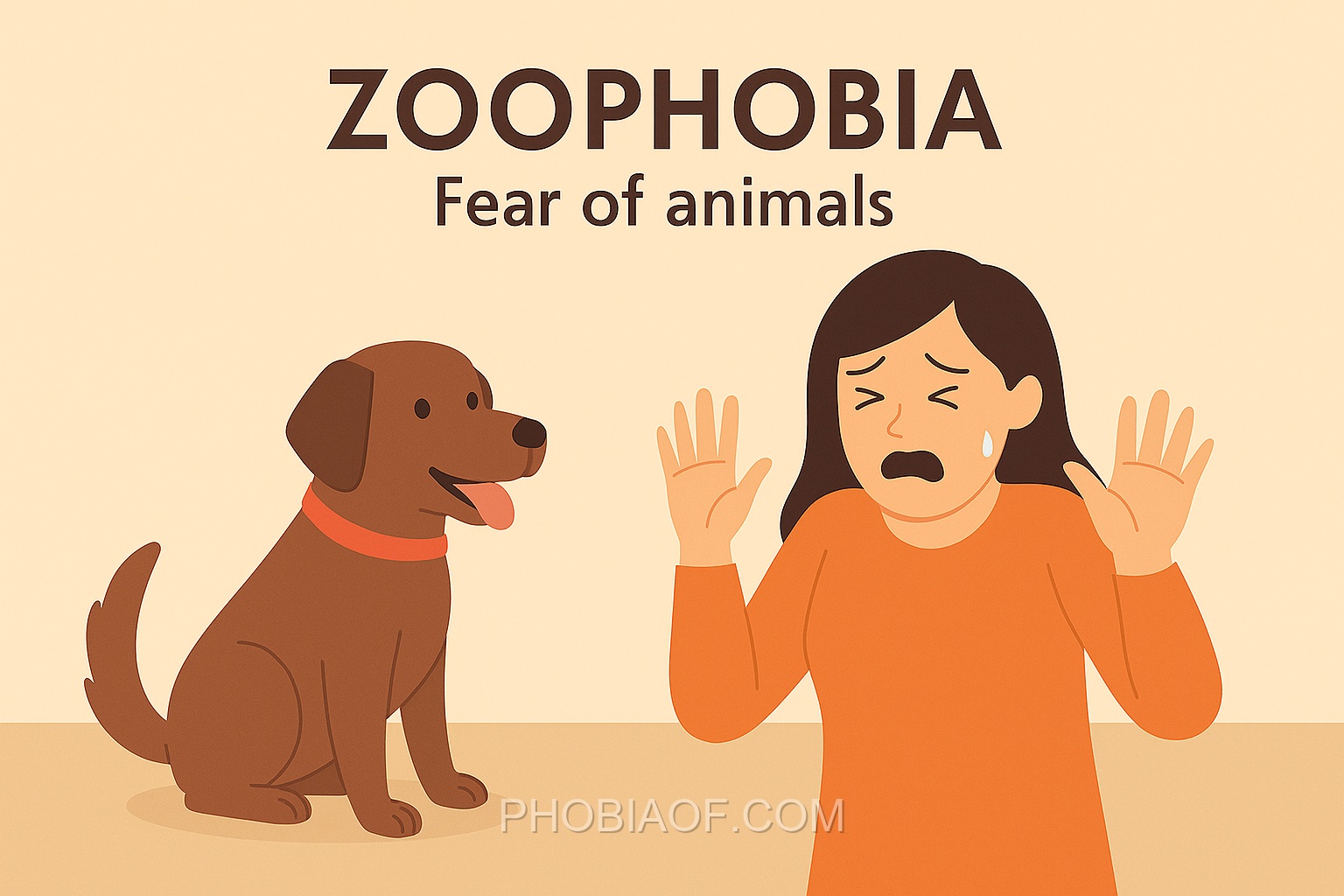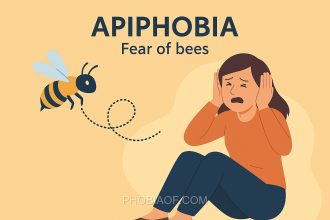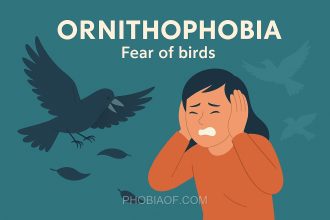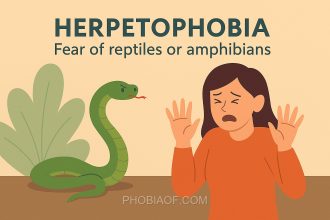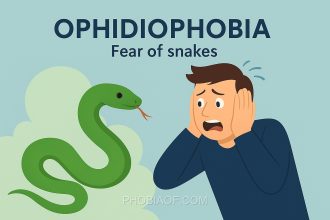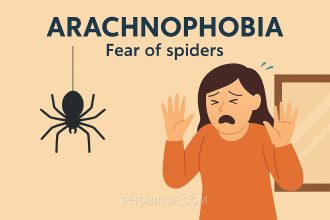Have you ever felt a sudden rush of fear at the sight of a seemingly harmless animal, like a bird or a dog? If so, you’re not alone. This intense fear is known as Zoophobia, a term that comes from the Greek words “zoo,” meaning animal, and “phobia,” meaning fear.
In simple terms, Zoophobia is the fear of animals. It is a specific phobia that can range from mild discomfort to a debilitating condition that affects a person’s daily life. People with Zoophobia often experience an overwhelming sense of anxiety when they encounter animals, whether in person or sometimes even in pictures or videos.
Zoophobia can significantly impact an individual’s life, manifesting in various ways. For some, it might mean avoiding certain places like parks or zoos, while for others, it might lead to panic attacks at the mere sight of an animal. The fear can stem from a variety of triggers, including past traumatic experiences, cultural influences, or simply the unpredictability of animal behavior.
- Avoidance: Those affected may go out of their way to avoid places or situations where they might encounter animals.
- Anxiety: The presence of animals can cause intense anxiety, potentially leading to panic attacks.
- Daily Life Impact: This fear can limit social interactions and outdoor activities, impacting overall quality of life.
Understanding and acknowledging Zoophobia is the first step towards managing it. With compassion and the right support, individuals can learn to cope with their fears and lead fuller, more confident lives. If you or someone you know is struggling with Zoophobia, seeking professional help can make a significant difference.
Causes of Zoophobia
Zoophobia, the intense fear of animals, can arise from various causes. Understanding these potential causes is essential in addressing and managing this phobia. Here, we explore some of the common reasons why someone might develop zoophobia.
- Genetic Predisposition
Research suggests that genetics may play a role in the development of phobias, including zoophobia. If a close family member has a phobia, there is a higher likelihood that others in the family might also develop similar fears, possibly due to inherited traits or genetic predispositions.
- Traumatic Experiences
A significant number of people with zoophobia can trace their fear back to a specific traumatic event involving an animal. This could include being bitten, chased, or startled by an animal, leading to lasting anxiety and fear whenever they encounter animals again.
- Learned Behavior from Others
Phobias can also develop through learned behaviors. If a child frequently observes a parent or caregiver reacting fearfully to animals, they may internalize this fear and develop zoophobia themselves. This type of learned behavior highlights the influence of environment and upbringing.
- Psychological Factors
Underlying psychological issues such as anxiety disorders or other mental health conditions can contribute to the development of zoophobia. Individuals with a predisposition to anxiety may be more susceptible to developing intense fears, including the fear of animals.
- Environmental Factors
Exposure to negative information about animals, such as news reports or cultural stories that portray animals as dangerous, can also contribute to the development of zoophobia. This fear may be reinforced by societal or cultural influences that shape one’s perception of animals.
While these factors each play a significant role in the development of zoophobia, it is often a combination of these elements that leads to the onset of this phobia. Understanding the origin of zoophobia can aid in developing effective treatment and coping strategies, allowing individuals to manage their fear more effectively.
Symptoms of Zoophobia
Zoophobia, an intense fear of animals, can profoundly impact those who experience it. This phobia often manifests through a combination of physical, emotional, and behavioral symptoms. Recognizing these symptoms is crucial in understanding and addressing the fear effectively. Below is a compassionate overview of how zoophobia typically presents:
Physical Symptoms:
- Panic attacks when exposed to animals or even thinking about them.
- Excessive sweating, especially when encountering or anticipating an encounter with animals.
- Rapid heartbeat or palpitations triggered by the presence or thought of animals.
- Trembling or shaking when near animals or in animal-related situations.
- Shortness of breath or a feeling of choking during episodes of fear.
Emotional and Behavioral Symptoms:
- Overwhelming dread or anxiety at the thought of encountering animals.
- Avoidance of places or situations where animals might be present, such as parks or pet stores.
- Feeling powerless or out of control when faced with animals.
- Persistent worry about encountering animals, impacting daily activities and decision-making.
- Difficulty concentrating on tasks due to intrusive thoughts about animals.
When zoophobia is severe, these symptoms can significantly interfere with daily life, limiting personal freedom and affecting social, occupational, and educational experiences.
Treatment for Fear of Animals
Overcoming a fear of animals, known as zoophobia, is entirely possible with the right approach and support. It is important to remember that this phobia can be treated and managed effectively over time. Below, we outline various treatment options and coping strategies that can help you overcome this fear.
Proven Therapies
- Exposure Therapy: This therapy involves gradually and systematically facing your fear in a controlled environment. By slowly increasing your exposure to animals, you can desensitize yourself to the fear over time.
- Cognitive-Behavioral Therapy (CBT): CBT helps you identify and change the negative thoughts that contribute to your fear. By reframing these thoughts, you can reduce anxiety and develop healthier coping mechanisms.
- Counseling: Working with a therapist can provide you with support and guidance as you address your fears. A counselor can help you explore the underlying causes of your phobia and develop personalized strategies to manage it.
Self-Help Coping Techniques
- Relaxation Exercises: Techniques such as deep breathing, progressive muscle relaxation, and visualization can help calm your mind and body when you encounter animals.
- Meditation: Regular meditation practice can increase your overall sense of calm and reduce the intensity of your phobic reactions.
- Support Groups: Joining a group with others who have similar fears can provide mutual support and encouragement as you work through your zoophobia.
Medication
In some severe cases, medication such as anti-anxiety drugs may be prescribed to help manage symptoms. However, the focus should remain on therapy and developing effective coping skills to address the root of the phobia.
It is essential to seek professional help if zoophobia is interfering with your daily life. A mental health professional can guide you through the process of overcoming your fear, providing the tools and support you need to succeed.
Remember, you are not alone in this journey. With patience and persistence, you can conquer your fear of animals and enjoy a more fulfilling life.
Conclusion
Understanding the causes and symptoms of zoophobia is a crucial step in empowering individuals to address and manage this fear. By recognizing the specific triggers and manifestations of their phobia, individuals can take proactive steps towards finding effective coping strategies.
It is important to remember that many people successfully overcome or manage their phobias with time and the right support. With patience, perseverance, and professional guidance, it is possible to reduce the impact of zoophobia on one’s life.
For those seeking support, consider speaking with a therapist or consulting a doctor. Professional assistance can provide personalized strategies and interventions that cater to individual needs and circumstances. Remember, you are not alone, and help is available.
Embrace the journey towards overcoming your fears with optimism and hope. With each step, you are moving closer to a life where zoophobia no longer holds you back. Stay informed, seek support, and believe in the possibility of positive change.
